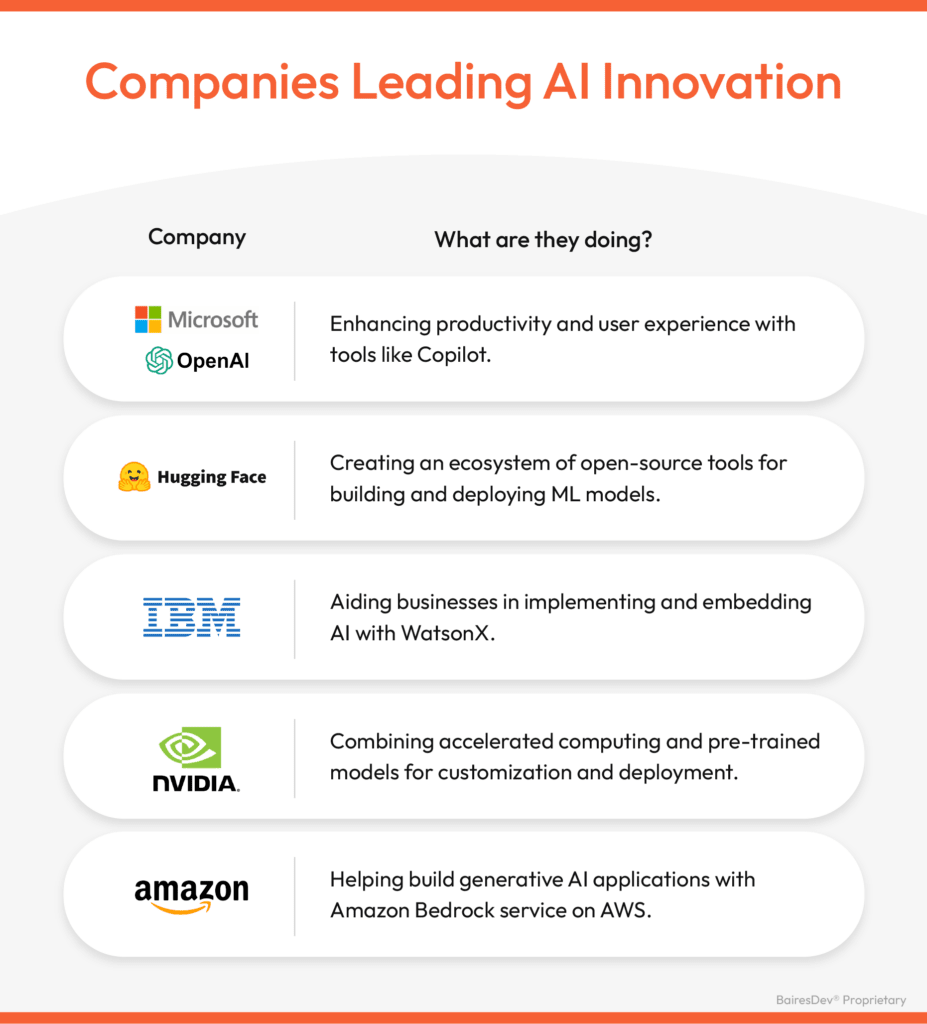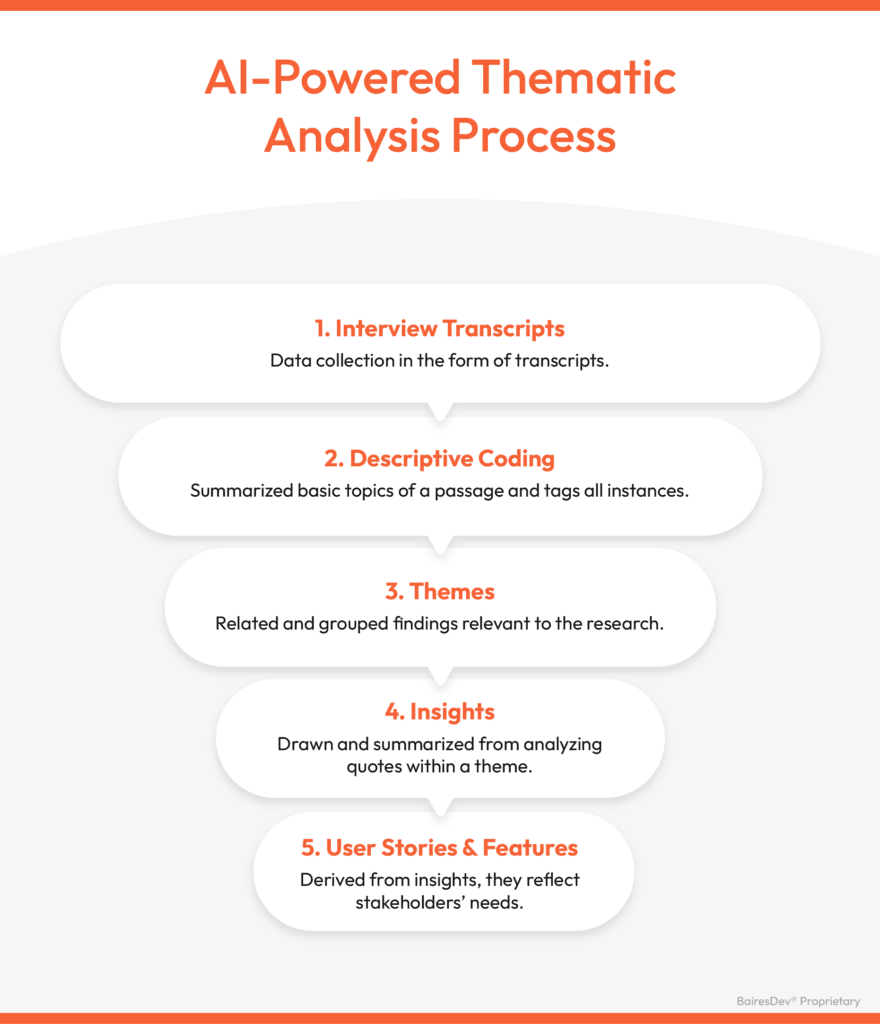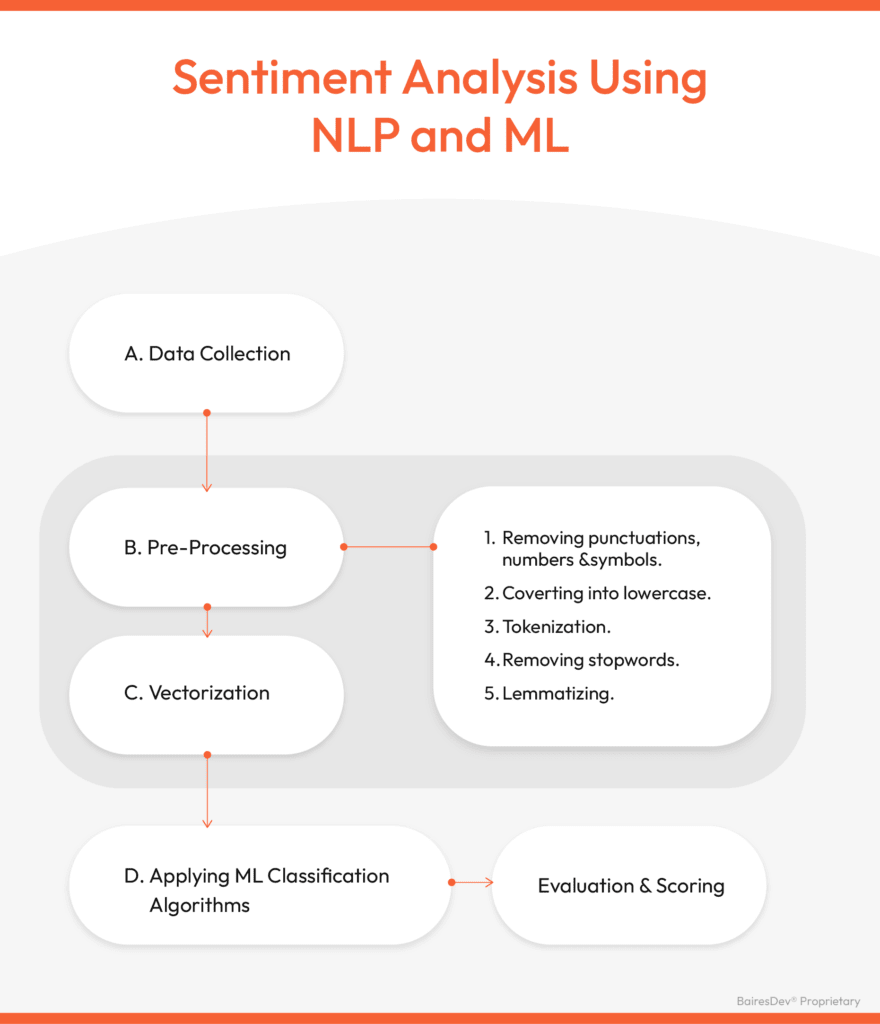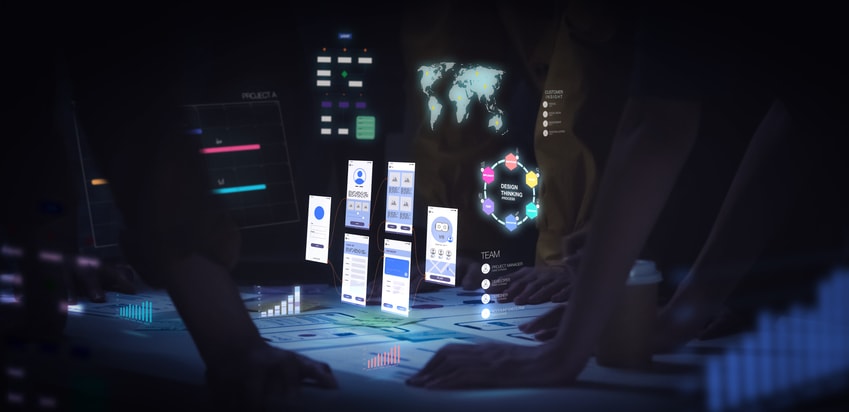Artificial intelligence (AI) has become a transformative force in product development, revolutionizing the way products are designed, created, and improved. Technologies such as automated chatbots, virtual digital assistants, and self-driving vehicles are powered by AI, demonstrating its ability to replicate human behavior and perform complex tasks.
The rapid adoption of AI tools like ChatGPT and GitHub Copilot is revolutionizing business, consumer interactions, and software development. A survey by TechReviewer.co revealed that among small and medium software companies, “90.9% of the companies are currently integrating AI technologies into their software development processes, while 9.1% haven’t adopted AI yet.” While it seems like a great majority leverages AI, a question remains: Are companies exploring AI’s full potential?
If you’re still skeptical about AI’s reach, take a look at what the leaders in the AI market have created so far, from open-source tools to integrations and platforms.

The world is preparing for a new chapter of efficiency, and you don’t want to miss out on it. How do you integrate AI into your workflow? Is it a seamless process, or can you expect a disruption as your talent incorporates AI into their daily routine?
Let’s take a general look at an AI-driven process and present use cases to understand what AI can offer. Consider this a methodology for thinking about AI integration.
First Steps: Product Ideation
One of the most challenging aspects of product development is ensuring clear and effective communication between developers and clients. Misaligned expectations can lead to costly delays and failing products. AI can serve as a mediator in these interactions, enhancing clarity and ensuring that all relevant information is captured and utilized.
AI as a Mediator in Developer-Client Interactions
A. Structured Interviews
Structured interviews are a key part of understanding client needs in software development. By sticking to a set list of questions, they ensure we collect consistent and thorough data. This makes it easier to compare responses and spot common themes and specific requirements. Pairing these interviews with AI tools like Insight7 takes things up a notch. AI can swiftly transcribe and analyze the interviews, giving us qualitative insights that really capture what clients need.
AI enhances the process by removing human biases and providing objectivity. It can analyze huge amounts of interview data much faster than a human, ensuring no detail is missed. For example, natural language processing (NLP) tools can pull out key themes and sentiments from transcripts, helping developers prioritize features that meet client expectations. Using structured interviews and AI together, software teams can make smarter decisions, resulting in more effective and user-friendly software.

For example, developing products in edtech is always a challenge since there are at least three different kinds of users: the students, the teachers, and the supervisors. Each group has different needs, from ease of use to management tools.
To address this, a company could invite users to send one-minute audio recordings of their ideal features. These recordings would be transcribed and analyzed by an AI system, which would categorize and prioritize common requests. By leveraging AI, the company could efficiently gather insights, leading to a more user-centric and effective educational platform.
B. NLP to Build Actionable Goals and Stories
AI can be a game-changer for software developers by turning qualitative insights into specific, measurable goals. After analyzing interview transcripts, AI tools can spot recurring themes and critical issues. For instance, sentiment analysis of these transcripts can reveal areas where clients are particularly satisfied or dissatisfied, providing a clear direction for improvement. By converting these insights into actionable goals, AI ensures the development team focuses on high-impact areas that boost user satisfaction and product performance.
AI-powered tools can continuously monitor and analyze feedback throughout the development process, allowing agile adjustments and refinements. This dynamic approach accelerates the development cycle by providing developers with clear, data-driven objectives.

In developing an e-commerce mobile app, AI tools can identify recurring issues like frequent complaints about the complexity of the checkout process. Using AI for sentiment analysis after each sprint helps pinpoint areas of high customer satisfaction or dissatisfaction, turning these insights into actionable goals.
Idea Generation and Validation
A. Leveraging AI for Brainstorming Sessions
AI can transform brainstorming sessions by seamlessly integrating into human conversations and collaborations. Tools like Colaj let AI join in real-time strategic and design discussions. AI can act as a bold brainstorming participant, suggesting ideas that humans might hesitate to share. As a stimulus engineer, AI can inspire creativity, help overcome creative blocks, and keep the flow of ideas constant.
B. Validating Ideas Through AI-Driven Market Analysis
AI has transformed idea validation in the early stages of software development with AI-driven market analysis. By processing large volumes of data, product managers, designers, and related roles can quickly spot trends, forecast demand, and analyze the competition. It’s no surprise McKinsey revealed that “73% of fashion executives said they planned to prioritize generative AI for trend analysis in 2024.”
AI algorithms help evaluate ideas’ viability before committing resources, boosting chances of success. AI tools can simulate business scenarios and forecasting outcomes, helping companies understand the operational and financial viability of product ideas.
Empowering Product Development Strategies With AI
New-to-Company Products
Incorporating AI into new product development (NPD) boosts innovation and efficiency, as shown by early adopters. AI aids in concept creation, business case building, and optimizing design, engineering, and testing. This reduces development time and results in better-designed products that effectively incorporate customer feedback.
Imagine using AI for rapid iteration to feature test a product your company has never worked on before. Let’s say your company specializes in consumer electronics but is now venturing into the smart home market with a new smart thermostat. By leveraging AI, you can simulate various user scenarios and environmental conditions to test different features of the thermostat. While this doesn’t replace expert consulting, it’s a way to prototype new ideas fast and with relatively low effort.

Enhancement of Current Products
A. Optimization of User Experience
AI enhances user experience by analyzing behavior and feedback. Advanced algorithms identify patterns and pinpoint improvement areas. For example, a fitness tracking app can use AI to determine which features are most used or ignored. This insight allows developers to refine the app’s interface and functionality, making it more engaging and increasing user satisfaction and retention.
B. Predictive Maintenance
AI enhances reliability by analyzing product usage and performance data for proactive maintenance. For example, in industrial machinery, AI monitors real-time sensor data to detect anomalies and predict failures, alerting maintenance teams to address issues before costly breakdowns occur.
Prototyping and Early Design
AI is revolutionizing the prototyping process, significantly accelerating the turnaround from concept to testing. Businesses can automate repetitive design tasks, generate high-fidelity mock-ups, and even produce code prototypes in minutes, if not seconds!
This rapid prototyping capability allows companies to explore a broader range of ideas and concepts swiftly, facilitating more robust and frequent user testing. Consequently, this leads to more refined and user-centric products, reducing time to market and enhancing overall innovation cycles. Moreover, AI’s role in prototyping extends beyond mere speed. It introduces greater flexibility and adaptability.
Just take a look at what’s possible with Relume AI. It took this coder 37 seconds to create an entire website mockup. As he goes on to clarify, it’s not a final design, but it sure provided a solid starting point for testing concepts and even creating MVPs.
Another plus is that AI in prototyping opens up the process, letting teams with basic coding skills create functional prototypes. This frees skilled designers from starting from scratch. Instead, they can focus on refinements.
What’s Next?
As we’ve explored, the integration of AI into software development is a transformative shift reshaping the industry. From enhancing communication between developers and clients to accelerating the prototyping and iteration phases, AI offers a multitude of tools that streamline and optimize the entire development lifecycle.
Adopting AI must balance technological advancements with human expertise and creativity. Keep an eye on the next articles in this series, where we’ll explore how to integrate AI-driven software development into your workflow.
Every business is unique, and custom AI tools use data specific to your company and industry. If you’re unsure where to start, contact our team to learn more about our AI development services.







